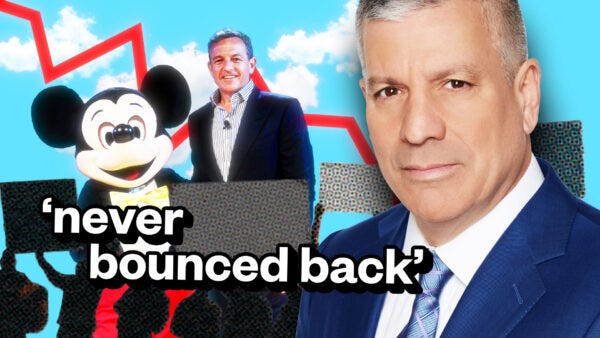Go Woke, Go Broke?
Charles Gasparino says Bud Light, Target, and Disney fiascos show that progressive politics kill the bottom line.
How a bunch of rich dudes became obsessed with the most leftist and radical interpretations of current events is really the central question I try to answer in Go Woke, Go Broke.’—Charles Gasparino
For my latest Reason Interview podcast, I talk with Charles Gasparino, a senior correspondent for the Fox Business Network and a columnist for the New York Post. He's also the author of the new book Go Woke, Go Broke: The Inside Story of the Radicalization of Corporate America. The book definitely has a point of view, but it’s not strictly polemical. There’s a ton of original reporting and analysis about mega-corporations make decisions that seem unbelievably stupid, short-sighted, and antithetical to the stories we’re told about genius financial wizards plotting everything out based on market data.
I’ve known Charlie for years and have always appreciated his working-class sensibility and over-the-top Italian-American charm. (It helps, I’m sure that I’m Ginzaloon on my mother’s side—her maiden name was Guida and her parents, who arrived in America in the 1910s, never spoke a word of English.) Unlike many journalists covering Wall Street, Charlie doesn’t have a silk-stocking background and the chip on his shoulder leads him to question a lot of what he’s told—which makes him an excellent reporter. He’s a cancer survivor who posts shots of himself doing chin-ups and workouts in public parks and downscale gyms rather than Equinox. Despite have a journalism master’s from University of Missouri (the country’s oldest journalism program, and still one of its very best), he’s a self-style throwback to days when newspapering was done by the likes of tough guys such as Jimmy Breslin and Pete Hamill.
In Go Woke, Go Broke, Gasparino analyzes in detail recent major missteps by companies such as Anheuser-Busch (Bud Light), Target, and Disney and explores how CEOs and top management become entranced by things like stakeholder capitalism; diversity, equity, and inclusion (DEI) programs; and environmental, social, and governance (ESG) plans to the detriment of customer satisfaction, public relations, and the bottom line. I don’t agree with him on large chunks of critique. Indeed, I think Whole Foods cofounder John Mackey’s ‘conscious capitalism’ has successfully challenged Milton Friedman’s dictum that the sole responsibility of business is to increase shareholder value. But Charlie’s reporting and insights are always interesting and revealing.
Four years out from the COVID-19 pandemic and the death of George Floyd, we talk about whether peak woke has ended and why he views people like Ed Rensi, the former head of McDonald's, as models for how businesses can make profits while being socially responsible. And we discuss whether he thinks Trump or Harris would be worse for the economy (realistically, with these choices, it doesn’t really make sense to talk about which one would be better).
Here is the YouTube video embed of our conversation and a list of topics and time codes. Below that are embeds of the audio versions at Apple, Spotify, and SoundCloud.
0:00-Introduction
1:12-The origins of Gasparino's book, Go Woke Go Broke
9:24-Bud Light X Dylan Mulvaney controversy
18:05-Corporate wokeness started with CEOs
25:06-Trump-world tried to save Bud Light
31:35 Ben & Jerry's pioneered corporate political activism
33:13-Wokeness at Disney
45:22-Does wokeness sell?
47:28-Where is the corporate advocacy for Uyghurs?
49:36-BlackRock, Larry Fink & ESG
59:00-How ESG worsened inflation
1:00:56-Ed Rensi's innovative interventions 1:05:52-Corporate wokeness is in recession
1:07:30 CEOs against campus wokeness
1:10:00-Would Donald Trump or Kamala Harris be worse for the economy?
If you like the Reason Interview and my work generally, please subscribe to Reason.
As always, let me know how I’m doing.





Looking forward to hearing this one. In this, 'I think Whole Foods cofounder John Mackey’s ‘conscious capitalism’ has successfully challenged Milton Friedman’s dictum that the sole responsibility of business is to increase shareholder value,' you're referencing a rather exceptional leader, and I agree. His approach, books, leadership and advocacy are excellent (and he's always a great guest with you!).